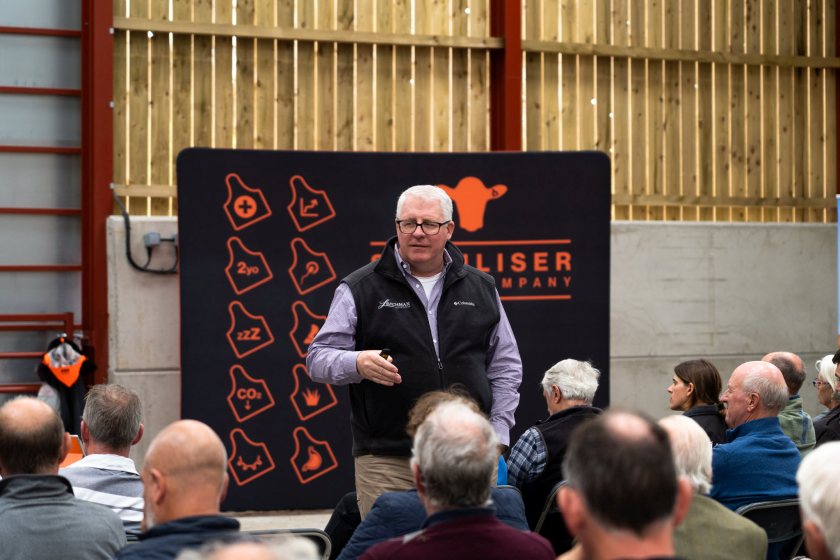
Legendary US rancher Lee Leachman has said Stabiliser cattle should become the standard suckler cow in the UK to help farmers with future challenges.
Mr Leachman, who is CEO of Leachman Cattle of Colorado, one of the five largest seedstock breeders in the US, made the remarks this week while on a tour of farms in Scotland and Northern England.
He described Stabiliser as ‘the best kept secret in temperate regions’, adding that hybrid genetics suited the UK extremely well.
“Britain has particular requirements,” he said. “Running cows on grass, over wintering them inside, feeding them low quality forage and still trying to produce shapely cattle.
"The best way to do that is by producing hybrid cows. Stabilisers thrive here. They produce well over a 95% calving rate so anything that does that must thrive.
“The shoe fits. Everyone breeds cows for different reasons, but if you’re looking at data and trying to make money, then hybrid genetics are the way forward. We don’t have many people stop using them once they start.”
Mr Leacham added that for the first time, society was demanding that cattle are productive, while at the same time delivering for sustainability and the environment.
“Generally, cattle change slowly, but we are seeing rapid, managed change,” he said. “Hybrid genetics are a game-changer and our breeders are continually moving to optimise production.
"This means moderately sized cows, better fertility, longevity, and better calves, which feed into everything, from lower carbon emissions to ease of care, eating quality and dollar profit.
“Hybrid production is normal in crop production, swine, and poultry. We’re using systems aligned with that in beef and I don’t think UK cattle farmers have any other source of feed efficiency tested, genomically evaluated composite genetics.”
Stabiliser cattle were created in the 1970s at the USDA Meat Animal Research Centre in Nebraska when investigating the benefits of composite breeding on cattle efficiencies, particularly in relation to heterosis, or hybrid vigour.
Three hybrids were created in the initial breeding programme and one that proved most profitable in both cow/calf and feed yard performance was a 25% composition of Hereford, Angus, Simmental, and Gelbvieh, which became the basis for the modern Stabiliser.
The breed was refined and improved by Mr Leachman, first as part of the Leachman Cattle Company in Billings, Montana, and latterly as part of Leachman Cattle of Colorado, which now markets more than 2,000 bulls each year.
Stabiliser cattle were first introduced to the UK in the late 1990s when a group of Yorkshire beef farmers, led by industry innovator Richard Fuller, started searching for a more efficient alternative to the dairy crosses they were producing at the time.
A total of 52 embryos were imported from the Leachman Cattle Company in 1999 which formed the basis of the UK herd.
Mr Leachman sits on the board of the Stabiliser Cattle Company, based in Southburn, East Yorkshire, which is responsible for improving and promoting the breed in the UK.
He said his visit to the country had been focussed on helping the Stabiliser Cattle Company direct their genetic improvements programme, as well as assessing the quality of the UK herd.
He said: “These visits are a great opportunity to see how cattle here are progressing and ask what UK breeders want to focus on for improvement.
“It is also fantastic to see people enjoying Stabiliser. They’re the UK's ultimate suckler cow with highly fertile, docility, calving ease, and efficiency.
"Raising beef is hard work, but raising Stabilisers is more fun and more profitable.”
